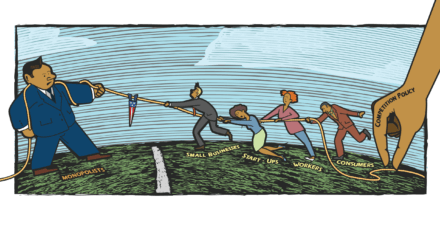LERA 2022 participants focus on boosting worker power and uplifting marginalized voices in the U.S. workplace

The Labor and Employment Relations Association recently held its 74th annual conference, gathering hundreds of presenters and attendees virtually from across industries, and including participants from labor, management, government, advocacy, and academia. From June 2–5, there were more than 80 sessions covering various aspects of the U.S. labor market, its dynamics and challenges, and how workers are navigating these unusual circumstances amid the ongoing coronavirus pandemic.
Given recent unionization drives in the United States, from Amazon.com Inc. warehouses to Capitol Hill staffers, the theme of this year’s event was especially prescient. Centered on worker power and voice in the workplace, LERA chose “Elevating Voice and New Voices in the Workplace and Beyond” as the event’s focus. The agenda highlighted the critical role of employee voice in the workplace and the ongoing need to empower and support that voice for workers, particularly those who have been historically marginalized.
Members of our network, as well as Equitable Growth staff, were featured in at least a dozen different plenaries, panels, and paper sessions. Below, we highlight some of the key moments, as well as panels and papers that caught our interest over the course of the 4-day event.
Former Equitable Growth President and CEO Heather Boushey, now at the White House Council of Economic Advisers, spoke in a plenary session with Equitable Growth grantee Ioana Elena Marinescu. The session, moderated by AFL-CIO chief economist Bill Spriggs, a professor at Howard University, focused on how antitrust law can be used to address wage suppression and inequality.
Boushey detailed the Biden administration’s work to boost competition across the U.S. economy using a whole-of-government approach—a proposal that was recommended in an Equitable Growth antitrust report co-authored by several competition policy experts. She also brought up President Biden’s commitment to strengthening worker power and the importance of unions for workers to be able to collectively bargain and thus provide a counterweight to highly concentrated power of employers.
Marinescu discussed her work on the impact of employer concentration on wages, noting that the assumption in economics that workers are paid roughly what they are worth is not always correct. In fact, she said, “when workers have fewer employers [who] they can turn to for jobs, you see lower wages in that market”—a trend derived from monopsony power, or high concentration of employers in a labor market.
Another panel session focused on worker resistance and labor shortages across the United States, including how unions and worker resistance play a role, featured grantee Ruth Milkman of the City University of New York Graduate Center. Panelists discussed the challenges facing the modern U.S. labor movement, such as scaling it to its former levels of membership, the impact of the 2018 West Virginia teacher strikes and the Red for Ed movement, and why worker shortages are good for labor.
Milkman specifically noted how the so-called Great Resignation in the wake of the COVID-19 recession is a “misnomer” because what’s actually happening is workers are “taking advantage of the labor shortage to look around and get jobs that they prefer to the ones they might have had in the past.” She cautioned analysts to keep an eye on whether this period of heightened worker power will result in long-lasting changes.
Equitable Growth’s Sam Abbott, our family economic security policy analyst, chaired a session on the care economy and its policy implications. Several Equitable Growth grantees presented their research. The University of Maryland’s Corey Shdaimah detailed her co-authored research with Elizabeth Palley at the School of Social Work at Adelphi University on early childhood care providers. The University of Chicago’s Julia Henley summarized her research on the pandemic and home-based child care providers. And Syracuse University’s Emily Wiemers presented her research on the long-term impacts of COVID-19 on care outcomes for high-need older adults.
Several Equitable Growth grantees also participated in a panel on the challenges of collective bargaining in the United States. Duke University’s Matthew S. Johnson discussed his co-authored research on trade competition and the decline in unionizations. Anna Stansbury from the Massachusetts Institute of Technology detailed her research on whether firms have incentives to comply with labor standards laws. In addition, attendees heard about co-authored research by Columbia University’s Suresh Naidu on why unionization rates in the United States have declined. Grantee Ihsaan Bassierof theUniversity of Massachusetts Amherst served as one of two discussants for the session.
Grantee Nathan Wilmers from MIT chaired a session on using data to study work and the labor market. His research was presented by co-author Carly Knight of New York University, who explained their study on why firms adopt new managerial ideologies and strategies using historical data from 1935–2005.
In a “LERA Best Papers” session, grantee Peter Fugiel of the University of Illinois at Urbana-Champaign presented his research on schedule unpredictability, looking at the prevalence of this scheduling practice across the U.S. labor market. His findings suggest that scheduling unpredictability is common in many sectors beyond those that are typically targeted by Fair Workweek laws, such as in retail and fast food chains.
Several other sessions caught our eye, speaking directly to our research and policy priorities:
- “LERA Plenary: Financialization, Corporate Governance, and Labor.” This plenary session highlighted a major theme of the event—the growing effects of financialization on workers and the U.S. economy and the importance of worker voice in mitigating these harms. Panelists, including Lenore Palladino of University of Massachusetts Amherst, discussed themes such as worker voice and greater workplace democracy as countervailing forces to financialization, including pressure from shareholders to increase profits instead of investing in workers or workplace safety, and the history and impacts of stock buybacks. The panelists also touched upon the racial justice elements of financialization, including how corporate equity is predominately held by wealthy White households, thus driving racial wealth divides.
- “Pay Equity Laws: Intended, Unintended, and Unpursued Consequences for Tackling Gender Wage Gaps.” This panel session looked at a slate of pay equity laws, including banning salary history questions, prohibiting pay secrecy policies, and mandating companies to report pay data to overcome gender wage divides. One study by Laura Adler at Harvard University found that salary history bans resulted in companies asking about salary expectations, and that women were more penalized than men for stating higher expectations. Another panelist’s study found that Black and White women are more likely to work in places that ban salary sharing, compared to Latina women.
- “Preparing Hospitality Workers and Workplaces for the Future of Automation.” This panel session looked at the rise of algorithmic management applications in the hospitality industry, including hotel housekeeping. Panelists presented initial findings from a multi-year study that will develop mechanisms for worker input into the design and deployment of these technologies, reducing disruptions to workflow, boosting worker autonomy, and opening pathways for addressing any workplace issues.
- “Job Quality in the Restaurant Industry: An Examination of Human Resource Practices and Outcomes in Fast Food Chains.” This symposium session explored how franchising affects wages and other job-quality factors in the restaurant industry, and specifically looked at management practices. One study co-authored by Rosemary Batt of the Cornell University IRL School looked at the effects of unpredictable scheduling practices on turnover amid the COVID-19 pandemic, finding that unstable schedules exacerbated the rates of turnover in fast food restaurants.
The 2022 Labor and Employment Relations conference was an important opportunity for Equitable Growth to expand our network of interdisciplinary scholars and to learn about cutting-edge research on the relationship between worker power, the labor market, and inequality during critical period of resurgence for the U.S. labor movement. We look forward to future collaboration and participation with LERA and the many participants and speakers we heard from over the weekend.







